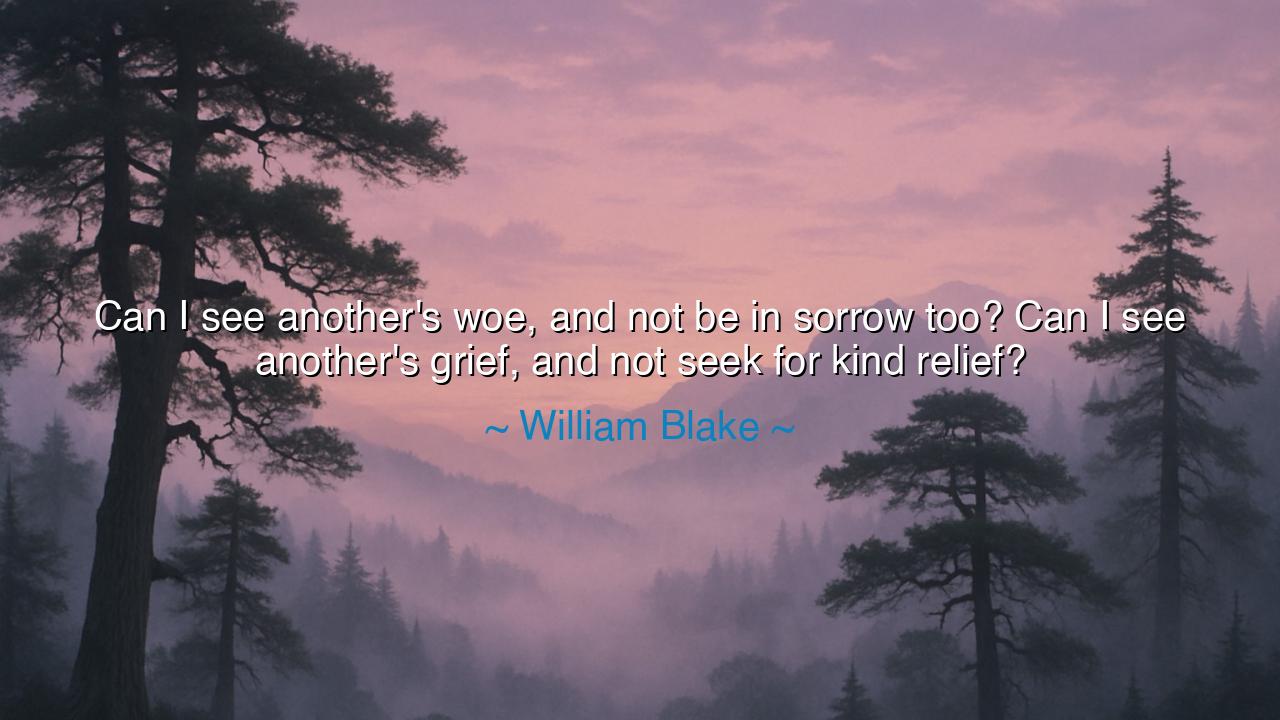
Can I see another's woe, and not be in sorrow too? Can I see
Can I see another's woe, and not be in sorrow too? Can I see another's grief, and not seek for kind relief?






The immortal words of William Blake, “Can I see another's woe, and not be in sorrow too? Can I see another's grief, and not seek for kind relief?” arise from the deep well of human compassion. They are not merely lines of poetry; they are the cry of the soul that cannot turn away from suffering. In these words, Blake reveals the divine spark within mankind — the sacred bond that joins every beating heart to every other. For to feel another’s pain as your own is to walk the path of the wise, the merciful, the truly human.
In the age of the ancients, philosophers and prophets alike spoke of this same truth: that empathy is the bridge between mortal hearts, and that to live without it is to be less than alive. The Stoics, though known for their discipline, taught that all souls share a single breath. The Buddhists called it karuṇā — compassion, the highest virtue. Blake, with his visionary voice, reminds us that to ignore the sorrow of another is to silence that divine voice within. The one who sees pain and does not feel sorrow has allowed their spirit to turn to stone.
Consider the story of Florence Nightingale, the “Lady with the Lamp,” who walked among the wounded soldiers of war. She saw their agony — the fevered cries, the blood, the loneliness — and she could not turn away. Her heart moved her hands; her sorrow became service. In her compassion, she found purpose, and through her purpose, healing flowed to thousands. She did not wait for kings or orders; her empathy was her command. In her, we see Blake’s vision made flesh — one who saw another’s grief and sought for kind relief.
Yet Blake’s words are not only a call to mercy, but also a revelation of interconnectedness. He teaches that sorrow is not solitary. When one suffers, all are touched by that shadow. Just as the ocean trembles when a single drop is disturbed, so too does the human spirit tremble when one of its own is in pain. The wise understand this, and so they do not ask, “Why should I care?” but rather, “How can I not?” For to comfort another is to heal a part of oneself, and to turn away is to dim the light that binds the world together.
In this truth lies a hidden power. Compassion is not weakness, as the unfeeling may claim — it is strength made gentle, courage turned inward. The warrior may conquer cities, but the compassionate conquer hearts. The one who lifts another’s burden grows stronger in soul, and the world grows lighter in their presence. Blake’s question, then, is not rhetorical — it is a challenge to every listener: Will you be moved, or will you remain still? Will you heal, or will you harden?
There is also wisdom in how Blake phrases his plea — not as command, but as wonder. “Can I see another’s woe, and not be in sorrow too?” He speaks as though disbelief consumes him, as though indifference is a mystery too cruel to fathom. This is the heart of the poet and the prophet alike: to feel so deeply that the idea of apathy seems unnatural. And indeed, in the truest sense, it is. For the heart was not made to be numb — it was made to beat in rhythm with others, to ache, to love, to heal.
So, let this teaching be carried forward: do not turn your eyes from the pain of the world, but neither be crushed by it. Let compassion move you to action — even the smallest act of kindness is a spark against the dark. Sit with the grieving, feed the hungry, speak gently to the weary. If you cannot heal all wounds, heal one. If you cannot carry the world, carry one soul across the storm.
For in the end, as Blake teaches, it is not grandeur or wealth that marks the noble spirit, but empathy — the sacred fire that burns in the heart of one who loves humanity enough to share its pain. So live in such a way that when you see another’s sorrow, your own heart stirs to life. Let it be said of you: Here was one who felt deeply, who loved fiercely, and who sought always for kind relief. In such compassion lies the truest strength of all.






AAdministratorAdministrator
Welcome, honored guests. Please leave a comment, we will respond soon